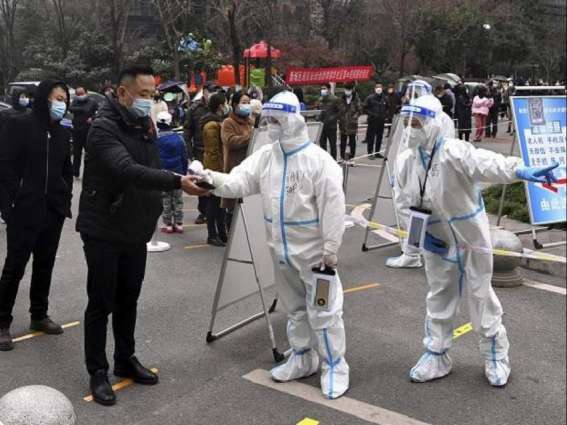While many countries have already lifted COVID-19 related restrictions to give their citizens some respite, a resident of Shanghai shared with Sputnik his concerns over the new harsh lockdown as China continued to pursue its "zero-COVID" policy
MOSCOW (Pakistan Point News / Sputnik - 02nd April, 2022) While many countries have already lifted COVID-19 related restrictions to give their citizens some respite, a resident of Shanghai shared with Sputnik his concerns over the new harsh lockdown as China continued to pursue its "zero-COVID" policy.
When COVID-19 first emerged in the city of Wuhan in central China in early 2020, the country's authorities faced unprecedented domestic criticism for trying to cover up the severity and transmissibility of the new coronavirus for weeks before finally taking measures to try to contain the outbreak.
As part of efforts to restore public confidence, the Chinese leadership decided to introduce tough lockdowns and quarantine all of the infected patients in order to halt community transmission of COVID-19.
While the pandemic ravaged the rest of the world and killed over six million people, the Chinese authorities celebrated its success in containing new local outbreaks through swift lockdowns and strict quarantine requirements for foreign visitors, which became widely known as the "zero-COVID" policy.
Thanks to effective vaccines and the apparently mild nature of the new Omicron variant of the coronavirus, many countries in the rest of the world started to treat COVID-19 as an endemic and pay less attention to new infections. Meanwhile, China began to face a dilemma as to whether to maintain its no-tolerance approach.
When Omicron-driven new infections emerged in the Chinese commercial hub of Shanghai in early March, local authorities first tried to contain the outbreak through designated lockdowns in areas of the city where new infections were detected.
However, as the designated lockdowns failed to halt new infections from spreading, Shanghai introduced a new lockdown scheme on March 28. Areas east of the Huangpu River entered a lockdown on Monday, which was to reopen on Friday morning just as western districts began a five-day shutdown. Nevertheless, the city government has expanded the curbs in the eastern districts, so the city found itself locked down completely on Friday.
Jacky Fang, a 41-year-old private business owner who happened to live in the areas east of the Huangpu River, shared with Sputnik his personal experiences during the new lockdown.
"My neighborhood fell under the designated lockdown as early as March 17, when a new case was detected among residents in the neighborhood. During the designated lockdowns, we were still allowed to go out to buy food for one hour between 6-7 a.m. once every three days. And we could still take a walk among the buildings in my residential compound without going out from the main entrance," Fang told Sputnik.
In China, most residential compounds are walled off with only a few entrances and exits, which makes it easier to lockdown specific compounds.
But when the harsher lockdown were introduced on Monday, Fang and his family were basically confined to their apartment.
"Under the new lockdown, we're not allowed to go out to buy food. We can only make orders for food delivery through our neighborhood community. Someone will deliver the food we ordered to our door. And we can't even leave our building, as the entrance is being guarded by staff members from the neighborhood community," Fang said.
When the lockdown plans were first introduced on Monday, videos began to circulate on Chinese social media showing panicked residents in Shanghai rushing to grocery stores to buy food, vegetables and other basic necessities. Fights even broke out among the worried shoppers who tried to grab the remaining food supplies.
According to Fang, the issue with possible food shortages in Shanghai is not because of insufficient supplies, but because the food could not be delivered to the residents under the strict lockdown.
"I tried to order food and vegetables from different online vendors. They had a lot of choices. But the problem was the vendors couldn't find the person who can deliver the products to us, as the demand for online delivery exploded because of the lockdown. So for now, I can only order the vegetable package offered by the local neighborhood community," he said.
The delivery constraints also drove the food prices much higher for Fang and his family.
"Before the new lockdowns, a package of potatoes, cucumbers and cabbages from our neighborhood community would cost 30 Yuan (about $5). Now, the same package costs 50 yuan. And they don't sell meat at all. The meat I bought before the lockdown can only last my family until tomorrow," he said.
In addition to concerns over the short-term food shortages, Fang is more worried about the lockdown's impact on his business.
After moving to Shanghai over 15 years ago upon graduation from a university in Belgium, Fang worked in the telecommunications industry for more than a decade before starting his own business on manufacturing customized production equipment for food producers last April.
As the manufacturing contractor of his company was based in the neighboring Jiangsu province, periodic local lockdowns last year already caused production delays up to two weeks at a time.
It usually took about two months for his company to complete an order from a client. The most recent order Fang's company fulfilled was in December. When Fang received a new order in January, lockdowns in Jiangsu province had already hindered the manufacturing process at his company.
"Normally, I would travel to Jiangsu once every two weeks to monitor the progress at the manufacturing contractor to make sure everything moved in accordance with requirement from our clients. But I haven't been able to go there because of the lockdowns in Shanghai. And if lockdowns in Shanghai are not lifted soon, I don't know if I can complete the current order for my client on time," Fang said.
Fang and the three employees relied on revenues from each order to provide income for their families for two-three months when the order was being fulfilled. If an order takes one-two months more to complete because of the lockdown, it means Fang and his three employees would have to survive on the income from the previous order completed in December.
"I do face a lot of pressure if we can't complete the order on time, as all of our livelihood depends on it," Fang said.
What worries Fang more is the fact that such lockdowns would always come back, as long as Chinese authorities continue to pursue their "zero-COVID" policy.
"I've talked to a number of friends who are also business owners. We're all worried about if there'll be an end to all of this. It's almost like the nightmares from early 2020 keep coming back. But in the end, it still depends on what the government decides to do," Fang said.
According to Fang, ordinary residents in Shanghai are still very scared of being infected by COVID-19, despite the relative milder symptoms of the Omicron variant.
"I've studied in Belgium and I've read the news about how other countries have dealt with COVID-19. I'm not so scared of COVID-19 infections anymore. But most people around me in Shanghai, including my family members, are still very scared of the possibility of being infected," he said.
For ordinary people in China to have similar views on COVID-19 infections as people in other countries, Beijing has to change their narratives about the disease, Fang added.
"Their attitude toward COVID-19 still resulted from the narratives presented by the Chinese government. Many people are not only worried about the deaths, but also the lingering health impact from COVID-19 infections," he said.
Zhang Wenhong, an infectious-disease specialist based in Shanghai, has been one of China's leading experts in dealing with the COVID-19 pandemic.
In a series of posts on his personal Weibo account, Zhang shared the details on how other countries began to view new COVID-19 infections differently and suggested that China could also follow a similar path in the future.
The recent delay in introducing harsh lockdowns in Shanghai signaled that local authorities could have tried to test new approaches by moving away from the "zero-COVID" policy.
However, once the number of new infections surged in Shanghai, it was clear that the city government could no longer handle pressure from Chinese leaders in Beijing.
In an interview with Chinese state press last week, Liang Wannian, the lead expert on China's emergency workgroup in handling the COVID-19 pandemic, tried to explain why his country could not follow other nations by moving away from the no-tolerance policy.
"The logic behind our containment measures is prioritizing the people and their lives. Other countries have already achieved sizable herd immunity through vaccination and natural infections. But our country's vaccination rate is not high enough. If we no longer adhere to the 'zero-COVID' policy, massive infections could still happen among the elderly people and vulnerable groups in our country," Liang said.
Liang stressed that the zero-tolerance COVID-19 approach was still the best choice for China at this point in time.




